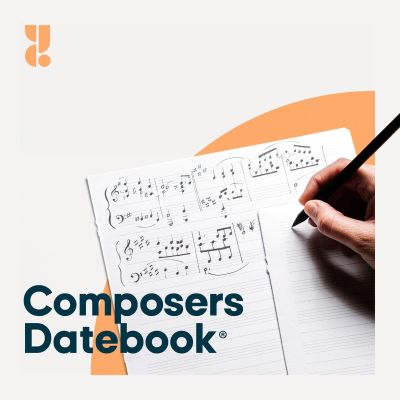Composers Datebook™ is a daily two-minute program designed to inform, engage, and entertain listeners with timely information about composers of the past and present. Each program notes significant or intriguing musical events involving composers of the past and present, with appropriate and accessible music related to each.
Gesamtlänge aller Episoden: 3 days 20 hours 54 minutes
The prolific Mr. Holmboe
If pressed to name a famous 20th century Danish composer, most concert-goers would say, “Carl Nielsen”–after all, he wrote five symphonies that get performed every now and then...
Edward Collins escapes to Wisconsin
In the 19th century, anybody who had the means would flee the stifling heat of the cities and head for someplace green and shady and cool: a country house, a spa perhaps, or maybe just a modest cabin by a lake. In the 19th century, it was Brahms who set the fashion for composers to spend their summer months in the countryside working on their music. His Violin Concerto and Second Symphony were the products of leisurely weeks spent in the lake district of Austria’s Carinthian Alps...
Monteverdi gets mugged (and a new job)
August 1613 proved to be an especially eventful month in the life and career of Italian composer Claudio Monteverdi. The previous summer his old employer, Duke Vincenzo of Mantua, had died, and Monteverdi was looking for a job. Fortunately, the position of Master of Music for the Republic of Venice opened up, and, on today’s date Monteverdi was probably rehearsing musicians for a trial concert of his music at St. Mark’s Cathedral. The concert was a success...
Arvo Part's "Brothers" in Salzburg
In 1980, the Estonian composer Arvo Pärt emigrated from his Soviet-controlled homeland and settled in Austria. Since the 1960’s, Pärt’s increasingly spiritual and overtly religious music, imbued with mystical and contemplative rituals of the Russian Orthodox Church, did not sit well with the communist authorities, and Pärt found it increasing hard to live and work in Estonia...
Gershwin and Daugherty go Latin
In the 1950s, if you said the words “Cuban music,” perhaps Desi Arnez, a.k.a. Ricky Ricardo, singing “Babaloo” might come to mind. These days, it’s more likely the Buena Vista Social Club. On today’s date back in 1932, George Gershwin had Cuban music on his mind when the New York Philharmonic premiered his “Cuban Overture” under its original title “Rumba...
Leon Theremin's good vibrations
When a flying saucer circled over Washington, DC, in the classic 1951 sci-fi film, “The Day the Earth Stood Still,” it did so to music played on an electronic instrument known as the Theremin. Its Russian inventor, Leon Theremin, was born in St. Petersburg on today’s date in 1896. In 1927 Theremin traveled to America, where he obtained a patent for an electronic instrument he called the Thereminovox. In the 1930s, Theremin arranged concerts for his creation at New York’s Carnegie Hall...
A posthumous premiere for Richard Strauss
There was a time when German opera houses would have fought over the chance to premiere a brand-new opera by Richard Strauss. But by 1940, when Strauss finished a mythological opera entitled “The Love of Danae,” there was a war on and Strauss had fallen out of favor with Germany’s Nazi rulers. A scheduled premiere in Dresden had to be cancelled. In Leipzig, the orchestral parts for the new opera were lost in a fire, and in Munich an Allied air raid damaged the opera’s sets and scenery...
Of Wagner, Tubas, and Gyorgy Kurtag
It's said that Nature abhors a vacuum—and so, apparently, did Richard Wagner, who devised a brass instrument to bridge a gap he perceived between the horns and the trombones in the orchestra of his day. And so the "Wagner tuba" was born, a brass instrument Wagner designed for the 1876 premiere of his cycle of four "Ring" operas in Bayreuth, Germany, which began on today’s date that year with “Das Rheingold”—the first opera in the “Ring” cycle...
Edison, for the record
Some have claimed that it was on today’s date in 1877 that the American inventor Thomas Edison recorded his own voice reciting, “Mary had a little lamb” on a tin-foil cylinder of his own design. Other historians date the precise birth of the phonograph earlier, others later. In any case, the Edison Speaking Phonograph Company wasn’t established until January of 1878...
Johann Strauss in Salzburg (and Vienna)
As the proverbial saying goes: “Necessity is the mother of invention.” It was, frankly, a matter of ECONOMIC necessity that led a 36-year-old Austrian conductor named Clemens Krauss to program an all-Johann Strauss concert by the Vienna Philharmonic at the Salzburg Music Festival on today’s date in 1929. The Festival was established in 1920 with high ideals but insecure funding. To succeed, the Festival needed both strong local support and wealthy visitors from abroad...
